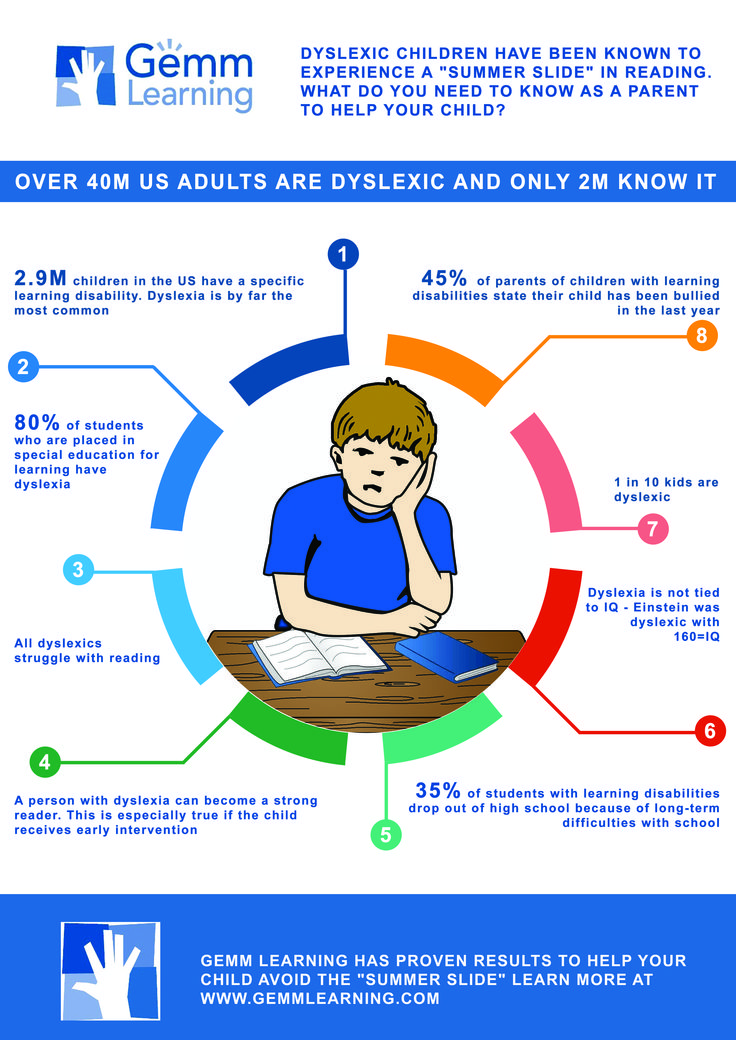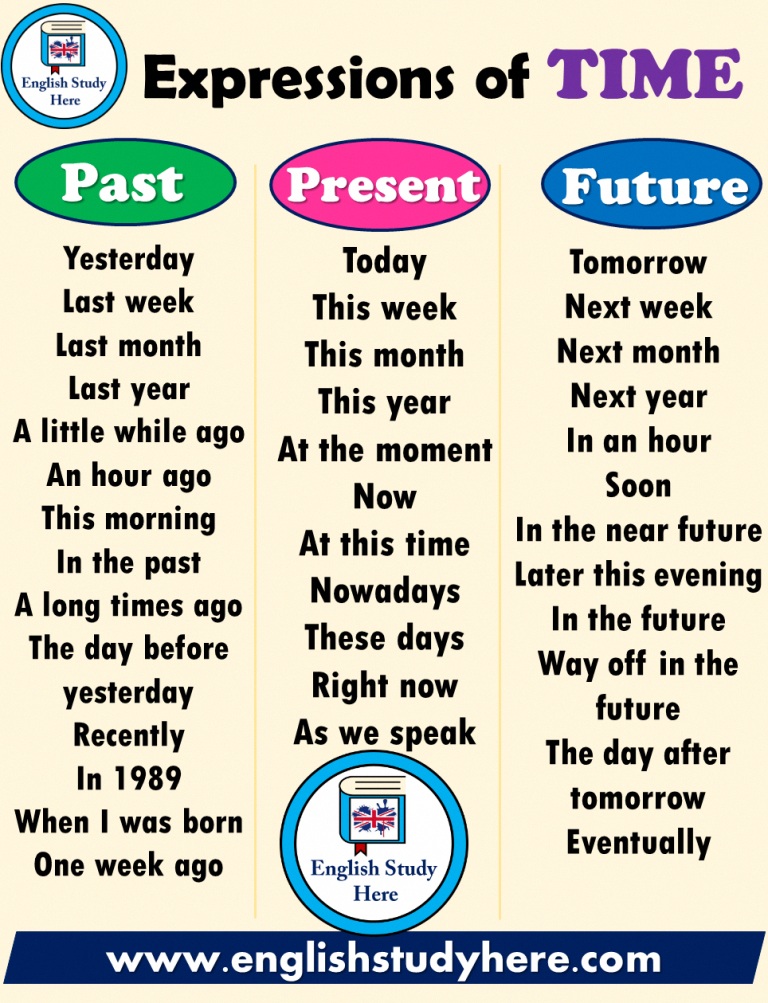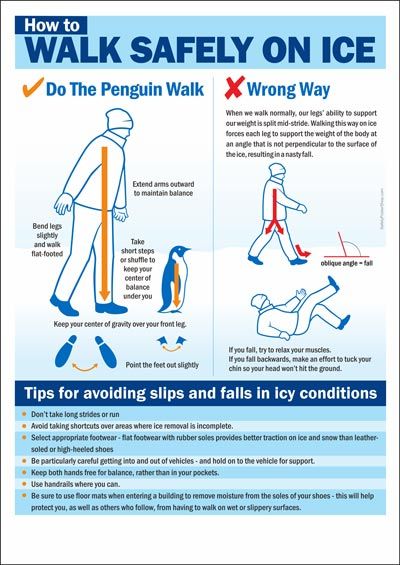How do i help my child with dyslexia
Understanding Dyslexia and How to Help Kids Who Have It
Children each learn and develop at their own pace, and reading is no different from other skill building. It’s common for kids to find reading challenging at one point or another. But if learning to read becomes an ongoing struggle that leaves a child falling behind their peers, it’s possible that they have a learning disorder known as dyslexia.
What is dyslexia?Dyslexia is most commonly associated with trouble learning to read. It affects a child’s ability to recognize and manipulate the sounds in language. Kids with dyslexia have a hard time decoding new words, or breaking them down into manageable chunks they can then sound out. This causes difficulty with reading, writing and spelling. They may compensate by memorizing words, but they’ll have trouble recognizing new words and may be slow in retrieving even familiar ones.
Dyslexia is not a reflection of a child’s intelligence — in fact it’s defined as a gap between a student’s ability and achievement. Some youngsters with dyslexia are able to keep up with their peers with extra effort at least for the first few grades. But by the third grade or so, when they need to be able to read quickly and fluently in order to keep up with their work, they run into trouble.
With help and strategies for compensating for their weakness in decoding, students with dyslexia can learn to read and thrive academically. But dyslexia is not something one grows out of.
How common is dyslexia?
It is estimated that as many as one in five kids has dyslexia, and that 80 to 90 percent of kids with learning disorders have it. Sally Shaywitz, MD, co-director of the Yale Center for Dyslexia and Creativity, notes that many children go undiagnosed as struggles in school are incorrectly attributed to intelligence, level of effort or environmental factors.
Although experts used to say that dyslexia occurred more often in boys than in girls, current research indicates that it affects boys and girls equally.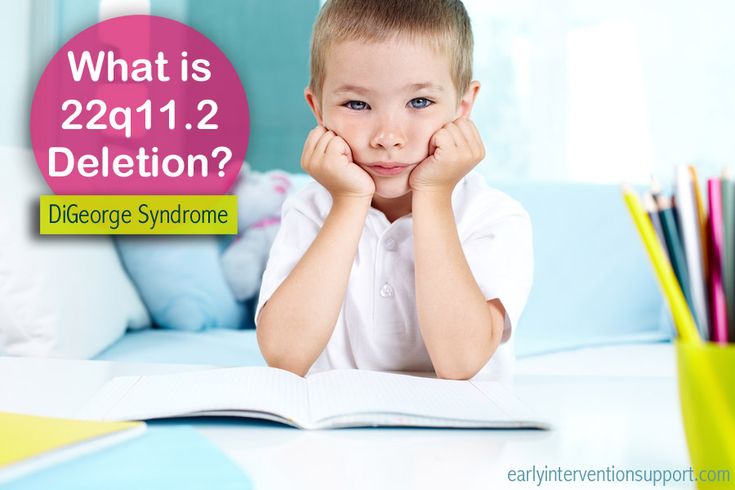
A young person with dyslexia may:
- Struggle with learning even simple rhymes
- Have a speech delay
- Have trouble following directions
- Repeat or omit short words such as and, the, but
- Find it difficult to tell left from right
In school, children with dyslexia are likely to:
- Have difficulty sounding out new words
- Lack fluency compared to other children their age
- Reverse letters and numbers when reading (read saw as was, for example)
- Find it difficult to take notes and copy down words from the board
- Struggle with rhyming, associating sounds with letters, and sequencing and ordering sounds
- Stumble and have difficulty spelling even common words; frequently they will spell them phonetically (hrbr instead of harbor)
- Avoid being called on to read out loud in front of classmates
- Become tired or frustrated from reading
Dyslexia affects children outside of school as well. Kids with dyslexia may also:
Kids with dyslexia may also:
- Find it difficult to decode logos and signs
- Struggle when trying to learn the rules to games
- Have difficulty keeping track of multi-step directions
- Struggle with getting the hang of telling time
- Find it especially challenging to learn another language
- Become incredibly frustrated, which can effect their mood and emotional stability
Dyslexia affects a lot more than reading — it can also impact a child socially. “A dyslexic person who has word-finding difficulties can have trouble with their expressive language,” says Scott Bezsylko, the executive director of Winston Preparatory School, which specializes in teaching kids with learning disorders. “That has a social impact, in addition to your difficulties with reading and writing, that make you feel not so good about yourself.”
Kids with dyslexia — particularly those who have yet to be diagnosed — often suffer from low self-esteem because they worry that there is something wrong with them, and are often accused of not trying hard enough to learn to read. “A lot of our work with dyslexic kids is to help them rediscover that they are smart and capable,” notes Beszylko, “because they’ve stopped believing in themselves.”
“A lot of our work with dyslexic kids is to help them rediscover that they are smart and capable,” notes Beszylko, “because they’ve stopped believing in themselves.”
How is dyslexia diagnosed?
If your child isn’t meeting expectations for reading, as parents you can ask the school district to perform an evaluation and share the results with you. The evaluation will test your child’s intellectual capacity and reading skills, to see if there is an achievement gap. It should also rule out other potential causes like environmental factors or hearing impairment.
The school should then make recommendations on how they can support your child and maximize her learning.
If you are unhappy with the quality of the evaluation, you can also secure a private evaluation by a psychologist, a neuropsychologist, a reading specialist, a speech and language therapist, an educational evaluator or a school psychologist. This external evaluation can also be used to advocate for your child and get the accommodations and services she might need.
When should a child be evaluated?
Dyslexia can begin to reveal itself at a young age, and there are preschool evaluations that look at the child’s awareness of the sounds that make up words, and ability at word retrieval. However, Matthew Cruger, PhD, a clinical neuropsychologist at the Child Mind Institute, suggests waiting until kids are at least six years old and have had some formal instruction in reading to seek out a formal evaluation.
But Dr. Shaywitz notes that as soon as a gap between intelligence and reading skills is apparent — and evidence shows it can be seen in first grade — it’s a good idea to get help. Schools sometimes encourage parents to wait until the third grade to see if their child truly needs an intervention, but Dr. Shaywitz argues that the earlier intervention is important not only to help kids catch up but to boost their fragile self-image, which is damaged by continuing struggle in school and comparisons with peers.
How to help kids with dyslexia
A dyslexia diagnosis does not mean your child will never learn to read. Dr. Cruger says there are a number of programs that can help, which might include these features:
Dr. Cruger says there are a number of programs that can help, which might include these features:
- Multi-sensory instruction in decoding skills
- Repetition and review of skills
- Intensity of intervention — that is, more than being pulled out of class once a week for extra help
- Small group or individual instruction
- Teaching decoding skills
- Drilling sight words
- Teaching comprehension strategies, to help kids derive meaning from what they’re reading
Reading programs that been shown to help kids with dyslexia include:
- The Wilson Method
- The Orton-Gillingham Approach
- Preventing Academic Failure (PAF)
- The Lindamood-Bell Program
- RAVE-O
Dr. Cruger points out that traditional tutoring may actually be counter-productive for a child with dyslexia, particularly if it is not a positive experience. “If the child hates the experience of reading help, it’s not helpful,” Dr. Cruger notes.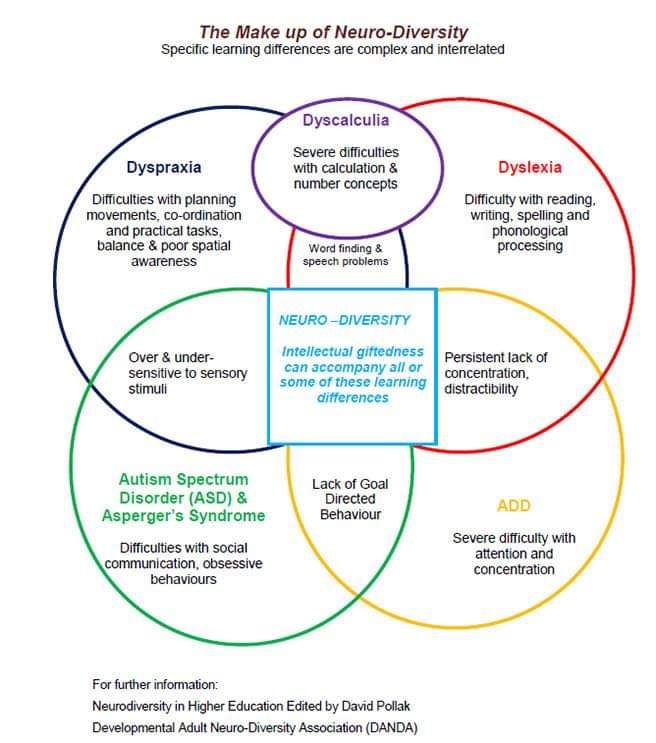 “And it’s not treating the source of the problem, the decoding weakness.”
“And it’s not treating the source of the problem, the decoding weakness.”
Instead, Dr. Cruger emphasizes that one of the most important ways to help kids with dyslexia is to make them more comfortable reading. This can be done in part by celebrating even small victories and accomplishments, while focusing less on correcting their errors.
Accommodations for kids with dyslexia
Kids with demonstrated dyslexia are eligible for accommodations in school. “Dyslexia robs a person of time,” Dr. Shaywitz explains, “and accommodations give the time back to her.” Accommodations may include:
- Extra time on tests
- A quiet space to work
- The option to record lectures
- The option to give verbal, rather than written, answers (when appropriate)
- Elimination of oral reading in class
- Exemption from foreign language learning
Other ways to support a child with dyslexia
One of the best ways to support a child with dyslexia — or any child who is struggling — is to encourage those activities that they like and feel good at, whether it is music, joining a sports team or anything else that helps build her confidence.
To help reinforce that dyslexia is not a marker of intelligence, it can also be helpful to talk about successful people — like Whoopi Goldberg and Steven Spielberg — who have also been diagnosed with dyslexia.
Other things that may help your child with dyslexia include:
- Listening to audio books as an alternative to reading
- Typing on a computer or tablet instead of writing
- Apps that can make learning fun by turning decoding into a game
- Using a ruler to help kids read in a straight line, which can help keep them focused
Emotional support
Dyslexia can result in frustration, embarrassment, avoidance and low self-esteem as a result of difficulties performing tasks that seem to come naturally to others. Demystifying the learning disorder with your child can help him develop the tools — and resilience — necessary to manage it, both in school and in social circumstances. Some things you can do to help include:
- Discuss the specific challenges that result from dyslexia: “You know how you have a hard time reading signs or copying notes from the board? That’s dyslexia.
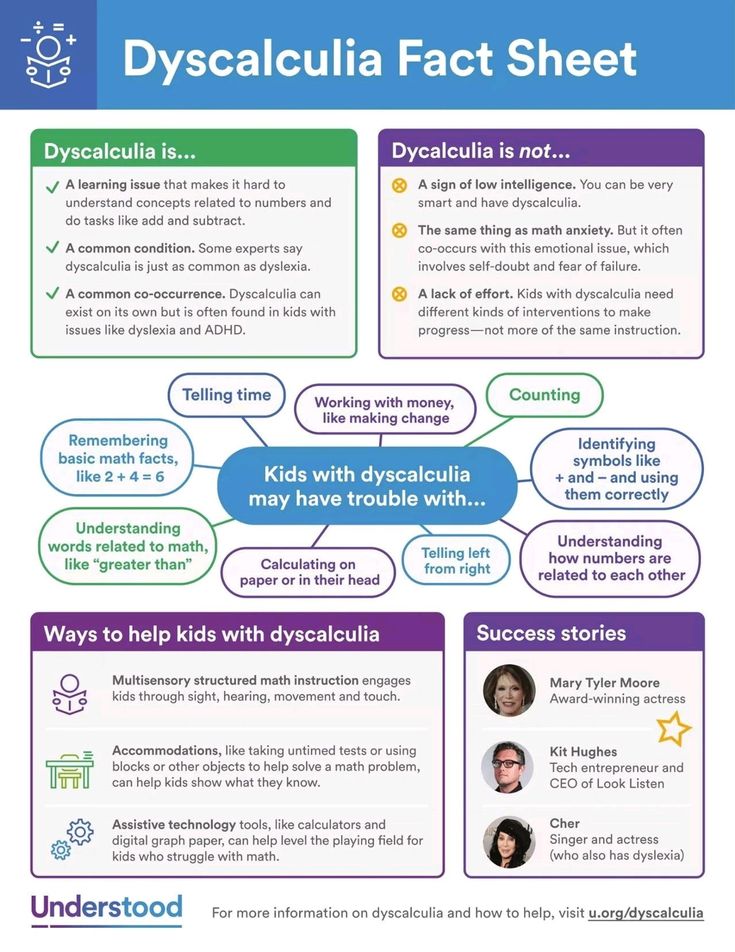 ”
” - Acknowledge their effort and celebrate hard work, even if there are still mistakes: “I know how difficult that reading homework was. I am so proud of how hard you tried.”
- Help them recognize their strengths: “You showed such great sportsmanship and teamwork in the soccer game the other night, and that was a great goal you scored!”
- Combat negative self-talk: If your child starts saying things like, “I’m just stupid,” don’t ignore it. Instead, check out these ideas for helping kids who are too hard on themselves.
Video Resources for Kids
Teach your kids mental health skills with video resources from The California Healthy Minds, Thriving Kids Project.
Start Watching
Frequently Asked Questions
How does dyslexia work?Dyslexia works by causing difficulty recognizing and processing the sounds in language. Kids with dyslexia might reverse letters, like reading pot as top, have trouble sounding out new words, and struggle to recognize words they know.
Dyslexia is the most common learning disorder. Dyslexia affects as many as one in five children.
What helps students with dyslexia?Systematic phonics instruction helps students with dyslexia learn to read. It’s also helpful for students with dyslexia to build confidence through small successes and positive experiences with reading.
What are the signs of dyslexia?Signs of dyslexia include talking later than other children, trouble learning simple rhymes, struggling to follow directions, or having difficulty learning left and right. In school, signs of dyslexia include struggling with reading, writing, spelling, and languages.
Beyond the Classroom: How Can I Help My Child With Dyslexia?
by: Linda Siegel, retired professor from the University of British Columbia, Vancouver Canada. Linda is the author of Understanding Dyslexia and Other Learning Disabilities published by Pacific Educational Press and also available from Amazon.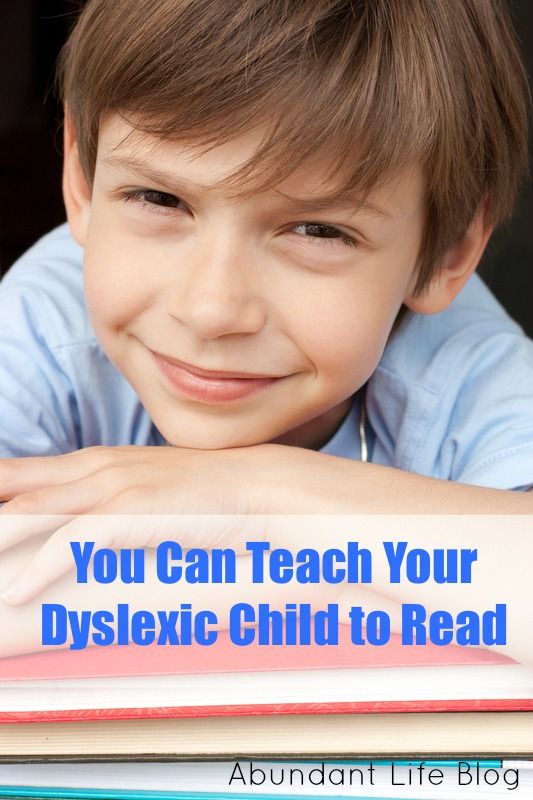
It’s become fashionable to speak of the “gift” of dyslexia, but it’s not that simple. Dyslexia brings emotional struggles. I think that many would choose to “regift” it if the opportunity arose. The most important way of coping with dyslexia is to help children find their abilities and be proud of their accomplishments.
Peer Pressure
“Lisa, why don’t you take that dark red lipstick? It’ll look good on you. Just slip it into your purse. No one will notice.” Lisa was a 13 year old with dyslexia, and two of her “friends” urged her to shoplift the lipstick. Dyslexic young people are especially vulnerable to peer pressure because they want to gain the admiration of their peers. In their minds it can make up for the humiliation that they experience in school. Adolescents are particularly vulnerable. Exposing the issue and role-playing this situation can help them learn to cope with the pressure.
Bullies
The other side of peer pressure is relentless teasing and bullying.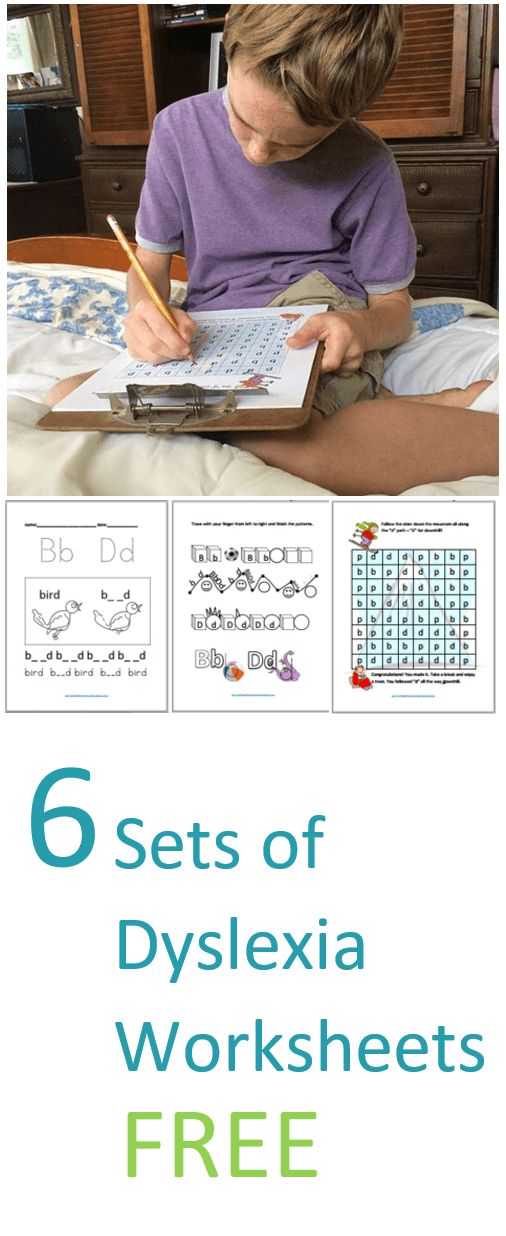 Teach children to recognize bullying and tell them to let their parents and teachers know what’s happening. Of course, they may be threatened or be afraid of being called a “baby.” Recognize their dilemma, and reassure them that they’ll be safe and that parents and teachers will pay attention to their concerns.
Teach children to recognize bullying and tell them to let their parents and teachers know what’s happening. Of course, they may be threatened or be afraid of being called a “baby.” Recognize their dilemma, and reassure them that they’ll be safe and that parents and teachers will pay attention to their concerns.
Survival Skills
Parents can help their children develop survival skills by:
- Recognizing Abilities
People with dyslexia often have considerable abilities in areas such as dancing, music, art, mechanical skills, and sports, among others. Find those strengths and encourage them.
- Teaching Persistence
Struggling with reading, spelling, writing, and/or mathematics isn’t easy. Help them break the long-term goal into small steps along the way. For example, rather than master all the spelling words or the entire multiplication table, start with only three spelling words or the five times table.
- Promoting Self-Advocacy
If your child is 12 or older, help him become an advocate for his rights.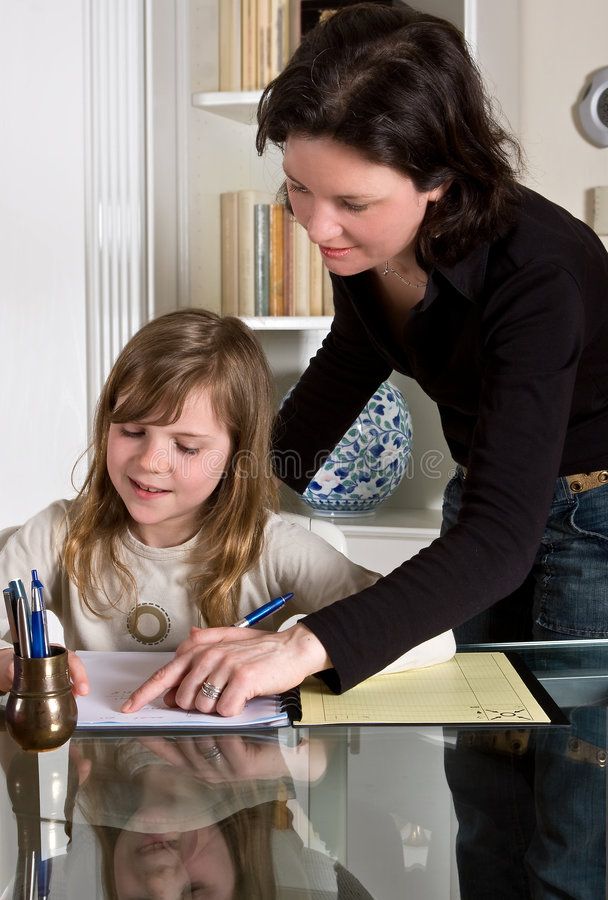 For example, he has a right to accommodations, whether it’s extended time for examinations, taking tests in a quiet room, having access to a calculator, using a computer, or anything else that helps him deal with his learning disability. Teach your child to advocate for himself in middle school. Being an advocate is important at all educational levels, middle school, high school, college and university.Part of self-advocacy is disclosing the problem. People with dyslexia have a dilemma. Should they disclose it to teachers or employers? Disclosing can get accommodations, but it can cause resentment and hostility.Another part of self-advocacy is asking for help when you need it. Maybe he didn’t understand an assignment or a concept. Teach your children not to be afraid to ask for help. He may encounter unsympathetic people but, hopefully, he’ll find patience and kindness.
For example, he has a right to accommodations, whether it’s extended time for examinations, taking tests in a quiet room, having access to a calculator, using a computer, or anything else that helps him deal with his learning disability. Teach your child to advocate for himself in middle school. Being an advocate is important at all educational levels, middle school, high school, college and university.Part of self-advocacy is disclosing the problem. People with dyslexia have a dilemma. Should they disclose it to teachers or employers? Disclosing can get accommodations, but it can cause resentment and hostility.Another part of self-advocacy is asking for help when you need it. Maybe he didn’t understand an assignment or a concept. Teach your children not to be afraid to ask for help. He may encounter unsympathetic people but, hopefully, he’ll find patience and kindness.
- Encouraging Teamwork
Studying with a small group helps many students with dyslexia.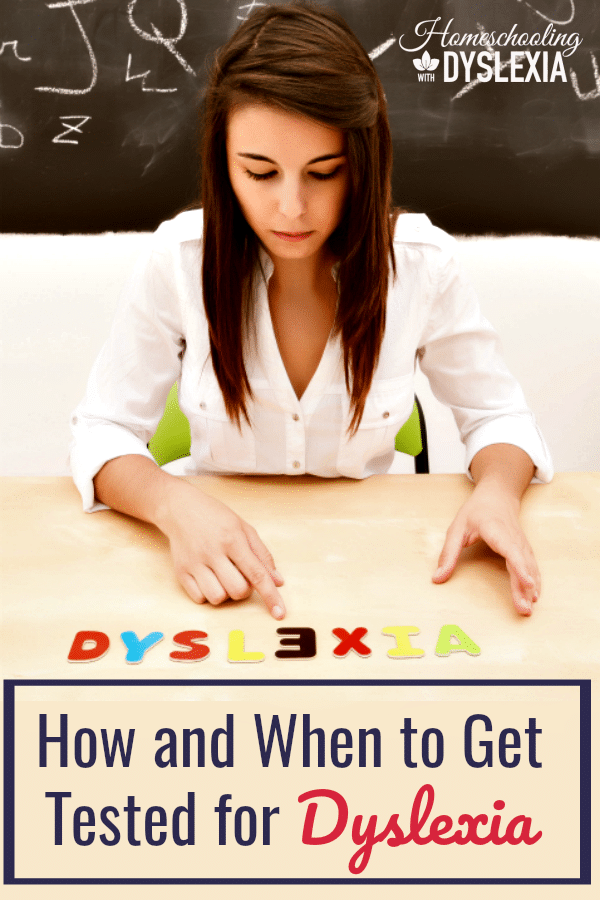 People have strengths in different areas; working with a group increases the chances of problem solving. Working on group projects can take advantage of each individual’s strengths; some are good at writing, others at drawing, others at research, and others at building models. Hopefully the school environment will recognize the value of teamwork.
People have strengths in different areas; working with a group increases the chances of problem solving. Working on group projects can take advantage of each individual’s strengths; some are good at writing, others at drawing, others at research, and others at building models. Hopefully the school environment will recognize the value of teamwork.
- Assuming Responsibility
Help your child to understand when he needs the help of others and when it’s necessary to do something without anyone’s help. There’s a fine line that requires a careful balancing act. Parents need to provide a supportive environment for their children with dyslexia, but they also need to let them fly. Resist the temptation to overprotect them.
- Providing Humor
“I’m not a slow learner; I am a fast forgetter,” one 16 year old told me. She added, “If you cannot laugh at yourself, whom can you laugh at?” Humor can diffuse a lot of situations if a person is equipped to use it.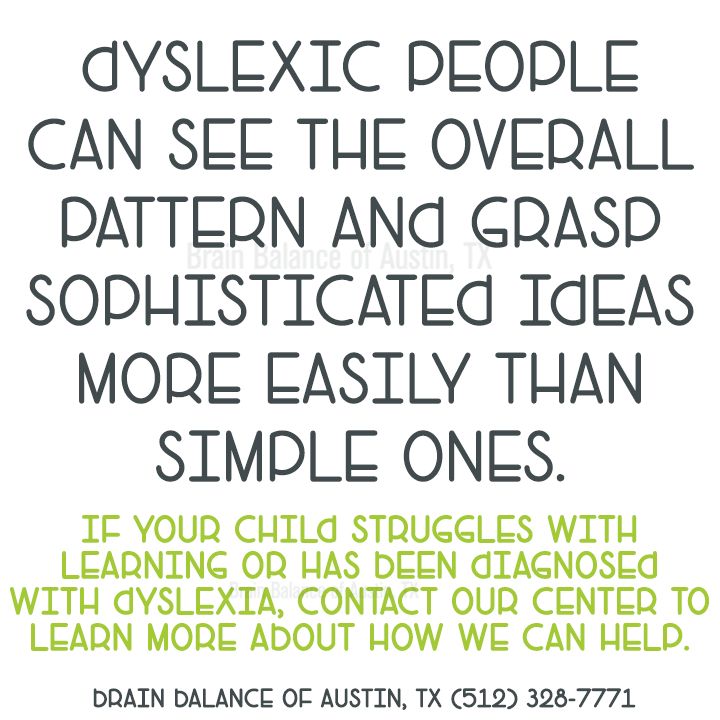
- Finding the Positives
Some people feel that struggling with dyslexia made them more sympathetic and interested in helping people. Some parents of dyslexic children think that dealing with the problems that their children have faced has made them stronger.Another key to staying positive is turning other people’s negative comments into something positive. For example one 13-year-old boy said when someone says, “You’re disorganized,” respond with, “No I see things from different points of view at the same time.“ If someone says, “You’re hyperactive,” she can say, “No I don’t tire easily.”
Helping Your Child Understand
A young child of 7 will ask, “Why can’t I read like everyone else?” The simple, but true answer is that everybody’s brain is different. It’s important to add, “You can swim very well, (play the guitar, draw lovely pictures or whatever). Your teacher will find ways to help you.”
Please never say, “Try harder.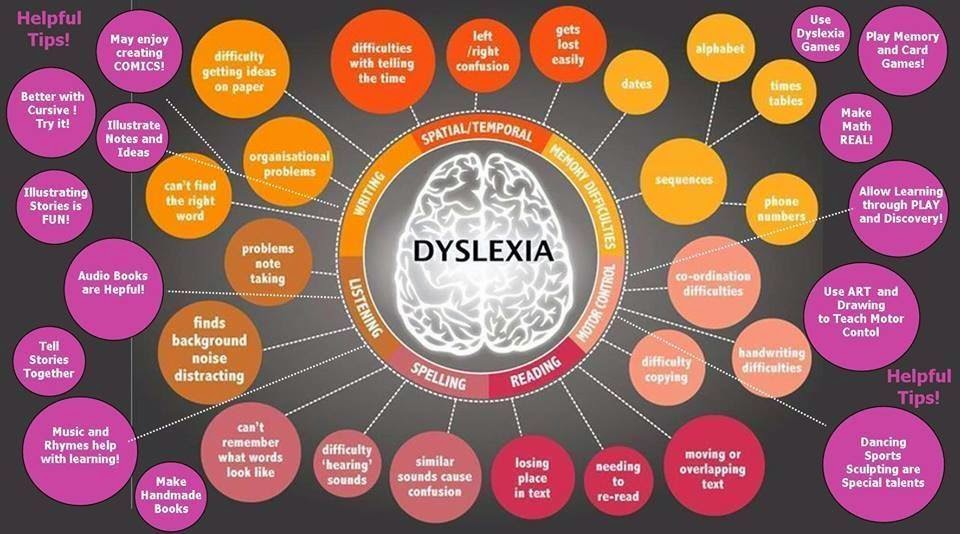 ” These are some of the worst words that a dyslexic person can hear. I know from experience. I cannot carry a tune. As a school child when we had singing in class, teachers told me to try harder and listen carefully but I really was doing my best. One children’s chorus conductor told me she could teach anyone to sing. When I shyly sang for her she said, “You’d be a very difficult case.” No amount of trying harder was the solution in my case just as trying harder is not the solution for the struggling reader with dyslexia.
” These are some of the worst words that a dyslexic person can hear. I know from experience. I cannot carry a tune. As a school child when we had singing in class, teachers told me to try harder and listen carefully but I really was doing my best. One children’s chorus conductor told me she could teach anyone to sing. When I shyly sang for her she said, “You’d be a very difficult case.” No amount of trying harder was the solution in my case just as trying harder is not the solution for the struggling reader with dyslexia.
Copyright © 2016 International Dyslexia Association (IDA).
We encourage sharing of articles from Dyslexia Connection. If portions are cited, please make appropriate reference. Articles may not be reprinted for the purpose of resale. Click here to request permission to republish articles from Dyslexia Connection or send an e-mail to [email protected] for more information.
How to help a child with dyslexia at home
A child with dyslexia needs help not only at school, but also at home.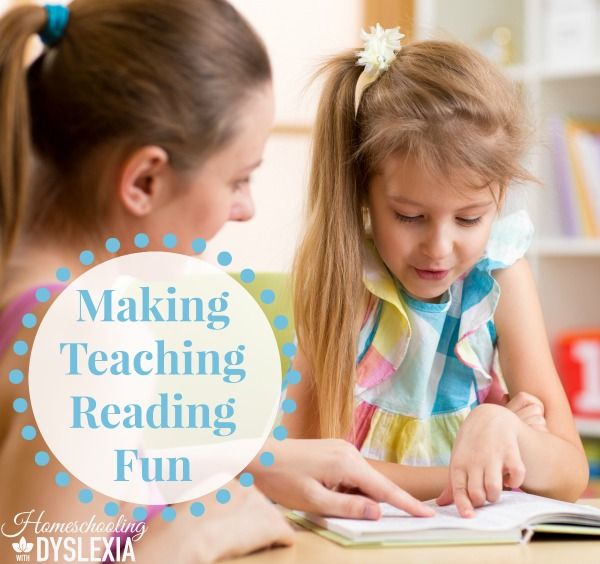 If professionals do it at school, then the rest of the time the responsibility lies with the parents. We talk about simple ways to help that parents can adopt.
If professionals do it at school, then the rest of the time the responsibility lies with the parents. We talk about simple ways to help that parents can adopt.
5 minutes 5495 Ivanov Roman0019
First of all, parents should remember that they are capable of many things. They are also professionals in their field - they know the characteristics of the child more than anyone else, and they can provide support and speak about love better than others. Half of the success with dyslexia is an adequate self-esteem of the child, faith in one's own strengths. To cope with the other half, that is, the necessary skills, parents need to learn more about how to better organize the learning process. It is better to check this knowledge with a psychologist who constantly deals with the child. nine0003
It is better to check this knowledge with a psychologist who constantly deals with the child. nine0003
How to help your child improve skills
Read
Make reading one of your favorite activities. Read for yourself so that the child takes an example from you. Read together to not only hone the skill, but also to get pleasant impressions. Start by reading aloud - first you, then the child, then you again. If it doesn’t work, connect audiobooks - let the child read along with the announcer. Do not be afraid to start with comics if your child likes them - there is less text and more favorite characters, which means more motivation. nine0003
NB : If your child often gets confused while reading, offer them a ruler. The child should put it under each line - this will help to concentrate.
Include play in learning
With play, lessons become easier, more emotions appear. Games are good to use for memory training: you can compose poems and songs to remember the daily routine or places for things and toys. Word games, for example, "Cities", "Contact", also train memory and develop speech. nine0003
Word games, for example, "Cities", "Contact", also train memory and develop speech. nine0003
Use multi-sensory experiences
Research shows that children with dyslexia need to use as many senses as possible to learn. For example, you can cut letters out of sandpaper. The child will not only see them, but run his finger over each letter and remember them better. You can also teach writing - write words not on paper, but with your finger in the sand, shaving cream, or even in the air.
Help organize the day
Discuss the daily routine with your child, compose it and hang it in a prominent place. It is better to color the hours of lessons and sessions with a psychologist so that they can be seen at a glance. Also help get ready for school - pack your backpack and other school things in the evening and put them to the door. nine0003
NB : Another way to teach discipline is to agree on which shelf you will put your things for class, and always put them there immediately after class.
How to help your child with self-esteem
Support your child
Celebrate successes, even if they are small. Each page read is a reason for praise, and each book is for great joy. First of all, praise for achievements in your favorite things, sports, creativity. The child should be aware of his strengths - help him in this. nine0003
Learn how to deal with stress
Practice on yourself first. Notice what happens to you when you are tired - become short-tempered, absent-minded or anxious. Tell your child about this and ask him to observe himself. As your child becomes aware of his own states of stress, teach him relaxation techniques such as deep breathing.
Talk about what dyslexia is and how to live with it
The child has the right to know what is happening to him. Tell him about dyslexia in simple terms, explain that it is not his fault, that you will deal with it together. nine0003
Read biographies of famous people with dyslexia: Einstein, Whoopi Goldberg, Jackie Chan, Orlando Bloom, Salma Hayek. Explain that this did not prevent them from revealing their strengths, focusing on their talent.
Explain that this did not prevent them from revealing their strengths, focusing on their talent.
Do's and Don'ts when communicating with a child with dyslexia
Compare with other children, even children with dyslexia
On the contrary, emphasize that everyone has their own strengths and weaknesses, their own pace of work, temperament and other characteristics. If the child doubts himself, make lists of strengths. For example, draw him in full growth and together with your child think about what is special and good about each part of his body. nine0003
Get angry if the child loses things, is late and cannot remember something
More precisely, you have every right to be angry. But try not to show it to your child. Gradually, you will get used to and will relate to being late more easily. But the child can remember your negative attitude even the first time.
Trying harder than necessary
Sometimes, and maybe often, the studies will not lead to success.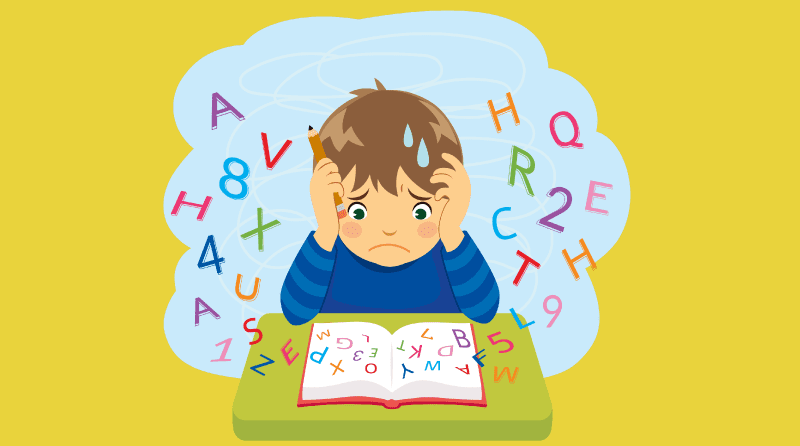 It's not about motivation, it's about lack of skills. Children with dyslexia want to learn to read and write. But they need a lot more time, conditions and love. nine0003
It's not about motivation, it's about lack of skills. Children with dyslexia want to learn to read and write. But they need a lot more time, conditions and love. nine0003
Diagnosis and treatment of dyslexia at the Neuroflex center
6 ways to help your child cope with dyslexia and love reading
My eldest daughter Larissa read her first words at the age of three and was able to read tiny picture books when she was four – not what you expect from a child with dyslexia, but the fact remains. Her form of dyslexia is called auditory perception disorder (AIA), which means that the message that reaches the brain through the ears is not always read correctly, so quite natural processes require more effort from her. Hearing impairment has nothing to do with hearing problems. This is one form of dyslexia. nine0003
Being an avid reader, I was very upset when Larissa came up and told me that she found reading so tiring, she even had a headache.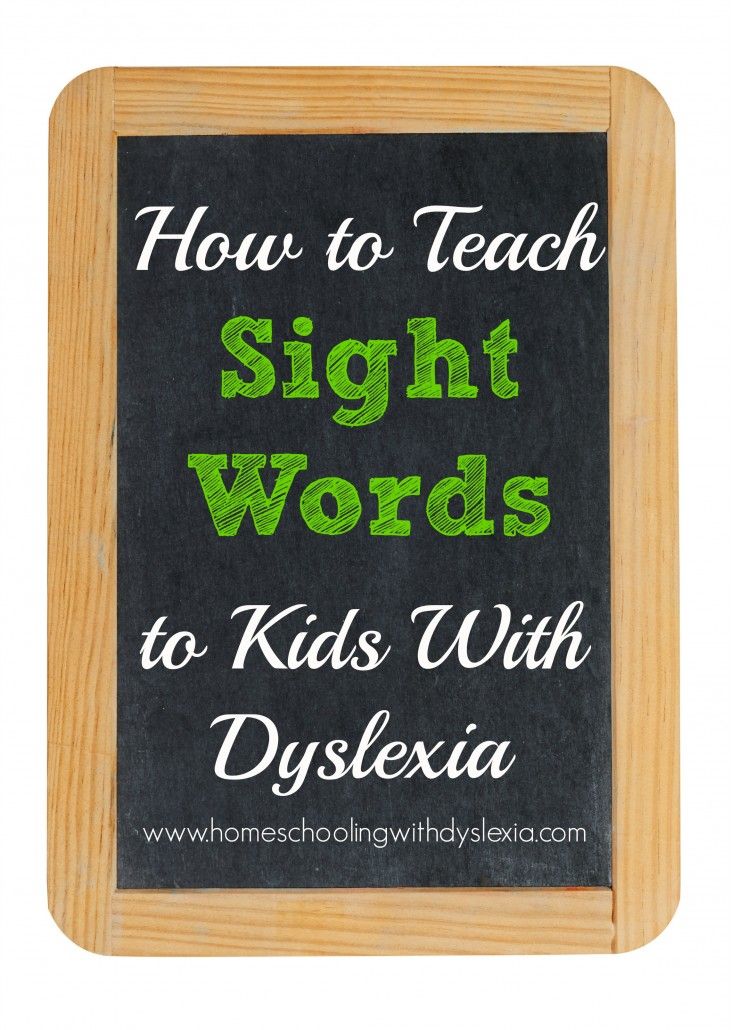 She later explained that when she read a sentence, it was like putting a difficult puzzle together piece by piece. First, he must learn all the words, then put them together into one sentence, and finally try to transform what he read into a picture in his head. We started working on this problem with auditory therapists and found a way to reduce the burden of reading. nine0003
She later explained that when she read a sentence, it was like putting a difficult puzzle together piece by piece. First, he must learn all the words, then put them together into one sentence, and finally try to transform what he read into a picture in his head. We started working on this problem with auditory therapists and found a way to reduce the burden of reading. nine0003
Larissa did a great job of telling me which books are easiest for her to read and which format is best for her.
There are several types of dyslexia and obviously all children are different, but you can definitely help your child gain reading confidence by making the process a fun and enjoyable activity. Larissa is now 11 years old. She is now an avid reader. Here are a few things that have helped her:
Talk openly and positively about dyslexia with your children. nine0035 Make sure they understand that dyslexia isn't something "bad" and doesn't mean they're not smart. It just means that their brains work differently.


